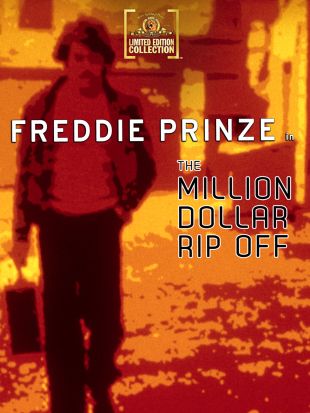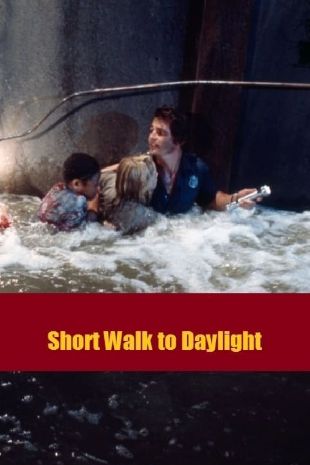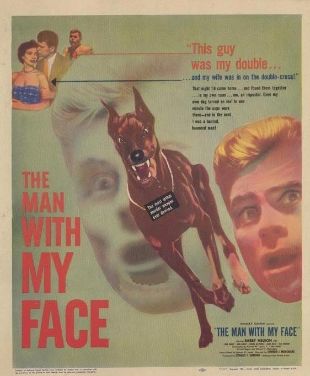Edward J. Montagne Jr. had a directing and producing career sufficient for three men: He made short films in the 1940s and directed one of the finest realistic crime thrillers of that decade; he was the producer (and sometime director) of two of the most successful television comedy series of the 1950s and '60s; and he was the producer and director of a string of successful theatrical and made-for-television features during the late '60s and '70s. The movie business was part of Montagne's birthright -- his father, also named Edward J. Montagne (1882-1932), was associated with Thomas A. Edison's film company in the first decade of the 20th century and was still writing important scripts 20 years later, during the transition period from silents to talkies.
Edward J. Montagne Jr. was born in Brooklyn in 1912. Director Norman Taurog, who had entered the industry with help from the elder Montagne, brought the man's son into the business at the outset of the 1930s by recommending him for a job at Paramount Pictures. Montagne Jr. started as a gopher and moved up to production assistant and later assistant director and second-unit director. Along the way, he got to know such luminaries as W.C. Fields and Jack Oakie, and worked in various capacities on movies such as It's a Gift (which he says was unique in its time for using a three-camera setup) and Million Dollar Legs. He later passed through the organizations of independent producers Edward Small, Walter Wanger, and Hal Roach. His earliest official credits were as an assistant director on movies such as The Villain Still Pursued Her (1940), Second Chorus (1940), and Fiesta (1941, credited in those years as Eddie Montagne).
Montagne was drafted in 1942 and served in the army as a combat photographer in the European Theater of Operations -- among other events, he was the photographer on the scene in Milan when Mussolini was strung up. After leaving the service in 1946, Montagne joined the documentary unit at RKO-Pathe and made a handful of nonfiction short films, then rejoined Hal Roach very briefly and returned to RKO-Pathe in New York. In 1949, Montagne began a five-year run as the director of a television series called Man Against Crime, starring Ralph Bellamy, which was done live, 52 shows a year, for its first three seasons. (Bellamy was appearing on Broadway at the time and would do the television show from a studio located in Grand Central Station, then jump into a waiting patrol car and be taken under siren to the theater for the night's performance; partway into the run of the show, the producers brought Robert Preston in as the Bellamy character's brother, to give him a few weeks' vacation.)
Man Against Crime was shot throughout the streets of New York, and was so successful and so popular with the producers and with the New York City Police Department that it led to Montagne's first major feature film, The Tattooed Stranger (1950). A murder mystery and manhunt shot entirely on-location in New York, it followed a trail blazed by Jules Dassin in The Naked City, but carried that movie's verisimilitude one step further, staying away from actors who even looked or sounded like Hollywood performers. The Tattooed Stranger was not only one of the grittier movies of its era in its look, but one of the more violent crime dramas of its time, elements that evidently helped turn it into an art-house favorite in France and possibly a serious influence on various New Wave directors in the making.
Montagne's next big success was, again, on the small screen, when he took over as production manager and then producer for the last four seasons of Phil Silvers' hit military sitcom, Sgt. Bilko (aka You'll Never Get Rich). He did two pilots with Silvers that didn't sell after that series left the air, and joined Universal Pictures' television unit in the early '60s, by which time he was pegged as a comedy expert. It was there that, at the suggestion of executive Sam Northcross, he was asked to take a look at a failed pilot for an hour-long World War II drama about a PT boat crew in the Pacific, called "Seven Against the Sea." He re-thought it as a comedy, eliminated one role and wrote in another for an antagonist, and he sought out the services of a young local television comic, then called Tom Conway, working in Chagrin Falls. Montagne got him signed up (and renamed Tim Conway, in deference to the British-born actor Tom Conway, long a Screen Actors Guild member), and McHale's Navy -- starring Ernest Borgnine, Joe Flynn, and Tim Conway -- was born. It was also Montagne's idea to add the character of Fuji (played by Yoshio Yoda), a surrendered Japanese sailor who was only too happy to serve the PT boat crew as their valet. This character was based on Montagne's memories of his service in Italy during the war, where his unit had surrendered Italian ex-soldiers on hand, not free but not quite prisoners, who did a lot of the heavy work required. (Montagne recalled in 2003 that years later, long after the series was over, Yoda called him from Japan and asked if he could name his just-born son after him, a rare honor in a business where actors and producers seldom see eye to eye.)
McHale's Navy ended up running four seasons and would have had a fifth if only MCA chairman Lew Wasserman hadn't hesitated to switch to color shooting, fearing that the first four seasons (done in black-and-white) would be dead in syndication if they did. The show was so popular during its run that Wasserman insisted that Montagne make a movie, McHale's Navy (1964), out of the series. The resulting script, about the PT boat's crew finding a champion Australian race horse on a Pacific island after the ship it was on is sunk, was based on a true story that Montagne remembered. That movie was so popular (perhaps the only successful feature film ever spun out of a television sitcom that was still on the air, defying the established wisdom that audiences wouldn't pay to see entertainment that they could get for free at home) that a second movie, McHale's Navy Joins the Air Force (1965), followed in short order. For that film, Montagne was left without the services of Ernest Borgnine, over a money edict from the studio. Joe Flynn was getting more money by then, and Wasserman declared that they could only afford to have two of show's three stars in the film; Montagne opted for Conway and Flynn, in what proved to be a very funny military satire, highlighted by some outrageous sight gags.
During the late '60s, Montagne was responsible for producing a string of successful feature films starring Don Knotts, most notably the poignant and psychologically complex comedy The Reluctant Astronaut (1967, which he also directed) and the Western spoof The Shakiest Gun in the West (1968), the latter a very effective remake of The Paleface starring Knotts and Barbara Rhoades. Montagne's other credits included the detective thriller P.J. (1968) and the Andy Griffith-starring feature Angel in My Pocket (1969). He was later the producer of such series as Quincy and Delta House, and produced (and wrote the original story for) the made-for-television feature Short Walk to Daylight, which was the basis for Rob Cohen's 1996 feature film Daylight.


